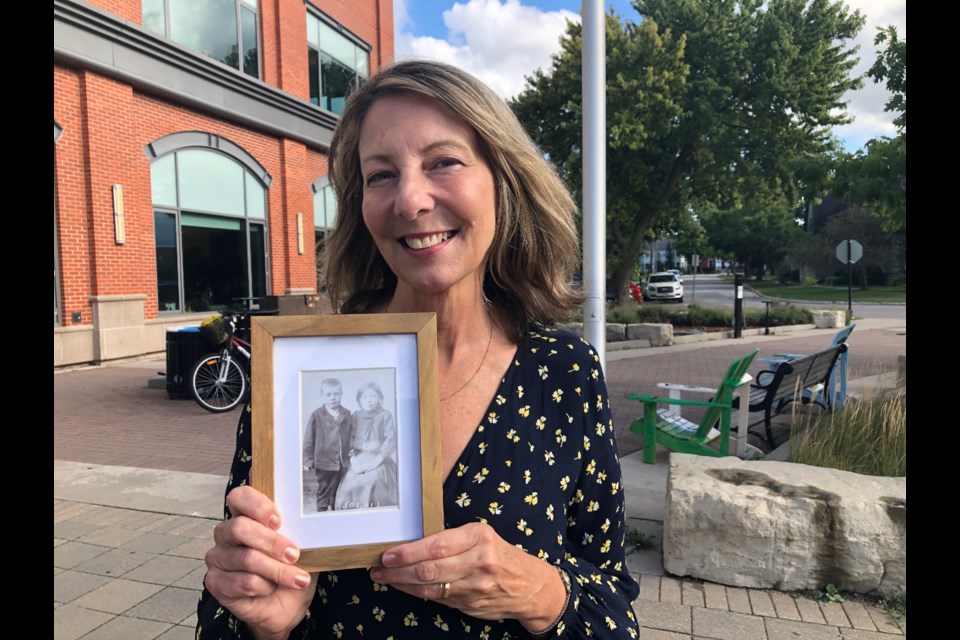“Imagine this,” read Julia Walkley-Sherman as she began to tell the story of her grandmother who, at the age of 11, was sent on a boat full of other young girls from England to Canada where she worked for seven years as an indentured servant.
She was reading the story to a small group of people gathered at the flag poles at Collingwood Public Library where she would soon raise the flag marking the 150th anniversary of the first British Home Children brought to Canada.
On Sept. 28, more than 150 communities across Canada and the U.K. will mark British Home Child Day to remember children like Walkley-Sherman’s grandmother, Ethel Fletcher, who spent more than four years in two different homes in Collingwood as a domestic servant from 14 to 18 years old.
“These children were described as scum, gutter rats, children born of depravity,” said Walkley-Sherman.
As a descendant of a British Home Child, she has advocated for communities to raise a flag to mark Sept. 28 as British Home Child Day, including her home community of Aurora and neighbouring Newmarket.
Newmarket council agreed to proclaim Sept. 30 as British Home Child Day, and the Riverwalk Commons and Fred A. Lundy Bridge will be illuminated in blue from sunset to 11 p.m. that day as additional recognition.
British Home Children were sent to Canada and Australia from the late 1800s to the mid-1900s. They were taken from their homes by charitable organizations — Bernardos was one of the main ones — and sent to Canada to work as indentured farm workers and domestic servants. It is estimated more than 100,000 children were sent to Canada.
Some were orphans, but many were not. In the case of Ethel Fletcher, her father was a widow who had trouble finding work. They lived in a one-room apartment in East London, and after selling everything they owned, were living in extreme poverty. A representative of Bernardos offered to take Ethel and her brother.
Fletcher moved to Toronto after she turned 18, where she worked and eventually married and had eight children.
Some home children were mistreated, and there are stories of the children being murdered by the families they worked for, some resorted to suicide.
“Many hid their early life stories, even from their families,” said Walkley-Sherman. Her grandmother didn’t talk to her about her life as a home child. “She told my mum, but mum said she wouldn’t repeat it to me.”
She said it was an emotional moment to see the flag raised in the community where her grandmother worked as a child.
“These little nation-builders would be overjoyed to know they are celebrated … and they mattered,” she said.
Sharon Baker, a Collingwood resident, attended the flag-raising and was excited to make a connection to her own grandmother, Elizabeth Shepperd-Williams.
“It was very moving,” she said.
Baker’s grandmother came to Canada as a home child at a young age (about four or five years old) and worked until she was 18 as a domestic servant. She worked at homes in the St. Thomas and London area.
“She couldn’t remember much, except being on the boat with other girls, it was scary for her,” said Baker.
Her grandmother’s last names came from the families who had her work for them. Nobody could get her to say her last name when she left England.
Baker’s daughter, Kelly Helsdon, the granddaughter of Elizabeth Shepperd-Williams, said she learned a lot from Walkley-Sherman’s speech during the flag-raising.
Sandra Cooper, former mayor of Collingwood, also has a connection to British Home Children. Her grandfather, John William Bonwick was brought to Canada as a home child when he was eight years old. He was first sent to Melancthon county for farm work, but he had rheumatism and the family he worked for thought he was lazy. They sent him to his brother in Collingwood, where he continued to work as an indentured farm servant.
Cooper said it made her proud to see Collingwood acknowledging British Home Day.
On the evening of Sept. 28, there will be red, white, and blue lights on the second floor of the Collingwood Public Library as part of the Beacons of Light tribute for the 150th anniversary of the first British Home Children being brought to Canada.



